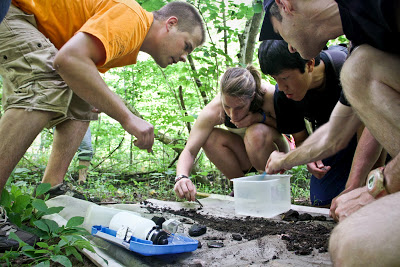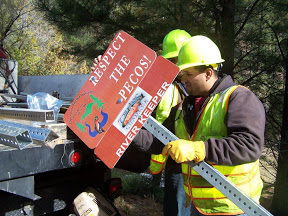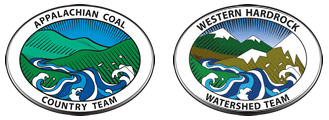Just who are rural volunteers? What are they doing? What are organizations in rural communities doing to recruit, manage and retain volunteers? What works? What doesn’t? The OSM/VISTA Teams set out to answer these questions with the “Volunteers in Rural Watersheds” Research Project.

THE NEED
After working in hundreds of rural communities with thousands of volunteers, it is clear that volunteers are necessary to the survival and mission of organizations striving to improve their community and environment. It also became clear that little empirical research into the role of volunteers had been done in these rural areas. Very few tools were available to help organizations overcome the unique challenges of recruiting, managing and retaining rural volunteers.
These challenges include:
– Less economic diversity than urban counterparts
– Mountainous terrain that can challenge commuting volunteers
– Lack of reliable internet and mobile phone coverage
– Small permanent population and ongoing population loss
With the support of the Environmental Protection Agency’s Office of Wetlands, Oceans, and Watersheds and the Office of Surface Mining, the OSM/VISTA Teams developed the “Volunteers for Rural Watersheds” Research Project to investigate solutions to these challenges. The study is the first of its kind to examine volunteerism in rural community/watershed improvement organizations throughout Appalachia, Colorado and New Mexico.
THE PROJECT
This three-year pilot project focused on developing resources that promote and improve locally-devised practices to encourage mobilization and participation of rural volunteers. Research was structured in three phases:
Phase 1: Collect and analyze survey data from volunteers in rural organizations in both the East and West.
Phase 2: Identify successful rural volunteer management practices; test practices for one year with two different rural organizations; compile case study accounts of trial practices.
Phase 3: Synthesize and disseminate findings as a toolkit of best practices to guide organizations in rural areas.
In the first study phase, surveys were collected from 315 volunteers with 16 organizations in Appalachia and the Rocky Mountain West. Those surveyed must have volunteered at a minimum of two watershed events for no less than two hours total and/or have attended at least half of group-specific meetings within the past year. Data was analyzed to form a general profile of rural volunteers and to gain valuable insight into their opinions, identifying who is most likely to volunteer and, perhaps more importantly, revealing gaps where new individuals and groups can be targeted for recruitment. A volunteer’s involvement in other organizations provides connections for potential partnerships that can benefit communities in new ways. Survey data also demonstrated that volunteers are very politically active, with a large percentage voting in national and local elections and contacting government officials at all levels about issues. The civic power of these volunteers is a large, often untapped resource for groups to use to spread awareness of issues and secure possible funding.

For the second research phase, 25 successful volunteer management practices were identified and tested for one year by one or two different rural organizations. Forty-eight case studies revealed successes, challenges and ideas for other rural groups to utilize. While each volunteer practice has its own specific characteristics and obstacles, several overarching trends emerged. The need for a lead person or committee to guide planning was a key factor in the success or failure of many trial practices.
In small rural communities, specificity of task and leadership was crucial. Broad appeals for help with tasks and events often went unheeded. Practices that employed targeted recruitment of individuals and groups with skills for specific tasks had the best results. For tasks requiring large groups or crews of volunteers, rural organizations often succeeded by bringing in outside groups, such as alternative spring break crews and faith-based mission teams.
Read Volunteers in Rural Watersheds Research Report for complete research findings. The raw data from all phases of the “Volunteers for Rural Watersheds” Research Project is available by request from the OSM/VISTA Teams. Click here for contact information.
Check out the Toolkit for Working with Rural Volunteers Project Brief for an overview of the research project and Toolkit.
THE TOOLKIT
Under-resourced and under-staffed organizations often pour all of their time and effort into an event or task and are able to achieve some goal: raise money, appear in the newspaper or recruit volunteers. Key tasks, especially with volunteer management, often slip through the cracks—such as gathering contact information for those involved, entering that information into a database, welcoming new individuals to the organization, developing them as committed dues-paying members, and informing them of upcoming events or tasks to continue their involvement. The list goes on.
After engaging in place-based research at 34 rural sites, this Toolkit was created to share approaches to volunteer recruitment, management and retention that are successful in rural settings. It is a source of new ideas with real-life accounts of where to start and what to expect, thus enabling organizations to learn from each other ways to improve rural communities with volunteers. We could have bound this information into an extensive 200-page manual, but we know that rural volunteer managers generally lack three things: time, people and money. An impenetrable block of “research findings” would simply gather dust on a shelf.
With this Toolkit, we aim to take this research to the next level by putting it in a usable format that establishes a complete framework necessary for sustainable volunteer management. Readers will not only learn new ways to work with volunteers, but be guided through the larger process of really bringing those volunteers into an organization and keeping them there—with the least amount of time, people and money—because we know you have a lot of important work to do.
ho should use this Toolkit?
This Toolkit is intended for rural volunteer managers—a term that encompasses anyone from a full-time paid staff member to a volunteer striving to involve more people from their rural community. Generally this involves working with less than 5 individuals to complete the tasks necessary for effective, sustainable volunteer management.

